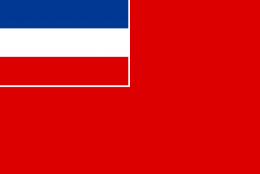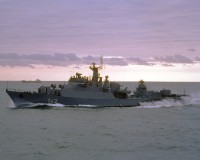Serbia and Montenegro Navy

Fleet
The Armed Forces of Serbia and Montenegro (Serbian: Војска Србије и Црне Горе/Vojska Srbije i Crne Gore; ВСЦГ/VSCG) included ground forces with internal and border troops, naval forces, air and air defense forces, and civil defense. Preceding the VSCG was the Armed Forces of Yugoslavia (1992–2003, Војска Југославије/Vojska Jugoslavije, ВЈ/VJ) from the remnants of the Yugoslav People's Army (JNA), the military of SFR Yugoslavia. The state, then named Federal Republic of Yugoslavia, participated in the Yugoslav Wars with limited direct intervention of its own armed forces. Following the end of the Wars and the constitutional reforms of 2003 by which the state was renamed «Serbia and Montenegro», the military accordingly changed its name. The military was heavily involved in combating Albanian separatists during the Kosovo War and Preševo Valley conflict, and also engaged NATO airplanes during the 1999 NATO bombing of Yugoslavia.
Upon the dissolution of Serbia and Montenegro with the Montenegrin independence referendum (2006), a fraction of the joint military was given to Montenegro, with the bulk of the force remaining in Serbia. Montenegro inherited the navy as Serbia is landlocked.
The Federal Yugoslav Navy was based in the Kotor and was largely made of vessels inherited from the SFR Yugoslav Navy. During NATO's Operation Allied Force in 1999, the Navy took control over civilian shipping around Kotor, despite NATO's blockade and in several actions the navy's warships fired at NATO aircraft that were on their way to strike targets. The Navy claimed to have shot down three UAVs over Boka Kotorska. The images of the remains of one of them were displayed online.
Ship classes1
- Comments
 en
en ru
ru uk
uk










 Serbia and Montenegro Navy
Serbia and Montenegro Navy Libyan Navy
Libyan Navy Egyptian Navy
Egyptian Navy Cuban Revolutionary Navy
Cuban Revolutionary Navy Yugoslav Navy
Yugoslav Navy Bulgarian Navy
Bulgarian Navy Volksmarine
Volksmarine Algerian National Navy
Algerian National Navy German Navy (Deutsche Marine)
German Navy (Deutsche Marine) Soviet Navy
Soviet Navy